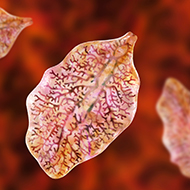
Occurrences are likely to be more widespread this season.
Livestock farmers are being urged to test livestock for liver fluke in an autumn and winter that could be 'very different' to recent years.
Experts say that relatively low and later occurrences of liver fluke in recent years should not make sheep farmers complacent this season.
The advice comes from the Sustainable Control of Parasites of Sheep (SCOPS) and Control of Cattle Parasites Sustainably (COWS). Speaking on behalf of both groups, Dr Phillip Skuce of Moredun said this year is 'shaping up to be quite different'.
He said: “It was very wet in some places this summer and autumn has seen rainfall well above average. Although temperatures have been quite cool, they have generally been high enough to allow fluke stages to develop across the country.”
A series of hot, dry summers in recent years has lead to relatively low levels of liver fluke cases and production losses across the UK. Experts believe these low numbers may have lured farmers into 'a false sense of security'.
John Graham Brown of NADIS said the provisional autumn forecast is predicting a medium to high risk on the west coast from North Wales up to Northern Scotland. Although the risk elsewhere remains low, Mr Brown warns that unpredictable weather patterns make it difficult to predict how this will translate to individual on-farm risk.
“It has been relatively wet and mild this year, so it is likely snail habitats, and therefore liver fluke, will be more widespread on farms than in previous dry summers. The mantra of ‘test don’t guess’ is going to be key," he said.
Dr Skuce agrees, adding: “Although liver fluke will be starting from a relatively low level, there is potential for the fluke population to build up this autumn into what is the traditional peak fluke season. Veterinary surveillance at the Animal & Plant Health Agency (APHA) supports this with reports of clinical cases of acute fluke since September.
“Testing remains the best option to cope with the unpredictability of fluke risk on an individual farm, avoiding treatments that are unnecessary or too early, while also making sure animals are treated in time to minimise any production losses. There is a SCOPS and COWS guide to the liver fluke tests available and how best to deploy them.”
Image (C) Shutterstock.



 The Veterinary Medicines Directorate (VMD) is inviting applications from veterinary students to attend a one-week extramural studies (EMS) placement in July 2026.
The Veterinary Medicines Directorate (VMD) is inviting applications from veterinary students to attend a one-week extramural studies (EMS) placement in July 2026.